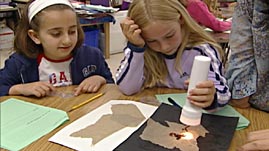Teachers' Domain - Digital Media for the Classroom and Professional Development
User: Preview

Source: WGBH Educational Foundation


Asking questions and making predictions and observations are the foundations of the scientific process, and all of these activities have a place in the K-4 classroom
While building new knowledge on acquired knowledge is an obvious step in students’ development, instilling metacognitive practices are just as important. Students can make predictions based on prior knowledge, then later reflect on and review these predictions once the experiment has taken place.
Soil, composting and earthworms provide the context for Katz’s lesson, which models scientific inquiry. Katz sets up a hands-on inquiry by having students relate their questions about earthworm behavior. She asks her students to predict how the earthworms will behave during certain events, such as encounters with light or darkness. Katz asks her students to draw out their thinking and to make connections background knowledge, their predictions, their observations of the experiment, and even the students’ companion social studies coverage of Native Americans.
Through these methods, Kats helps her students integrate knowledge, achieve a heightened awareness of their inquiry, and lay the foundation for future reflection on their predictions. Students therefore gain metacognitive skills that supplement the knowledge they gather from the lesson.
 Loading Standards
Loading Standards